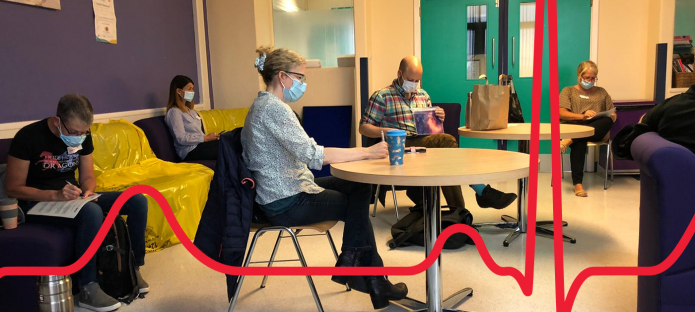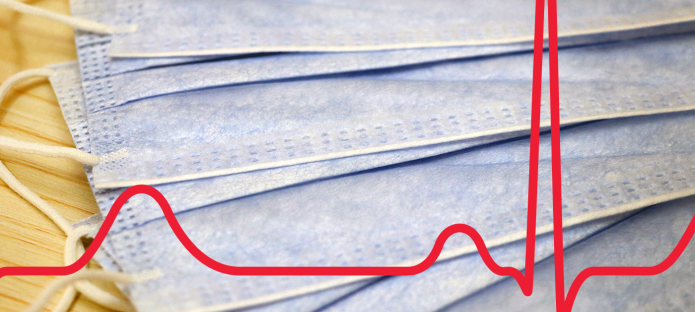The James Cook University Hospital in Middlesbrough successfully facilitated two (back to back) Newborn Life Support (NLS) courses in August 2020. Nicki Rennison explains how the course was modified and adapted to ensure social distancing was followed for the safety of everyone involved.

Prior to the course
One of the first priorities was to secure approval from the hospital’s senior operational COVID-19 working group to ensure they were comfortable with a major national course running and face to face training taking place. Face to face training continued to take place in the Resuscitation department throughout the COVID-19 pandemic and approval for this was obtained from the operational COVID working group early in the pandemic. This made approval for national courses an easier process as the Trust was eager to try and re-establish some normality.
The Conferences and Events department at James Cook University Hospital (JCUH) contacted the Candidates prior to the course with information about the measures that would be in place to ensure social distancing and personal safety.
The pre-course information also advised Candidates not to attend the course and to notify the centre if they were experiencing COVID-19 symptoms. This information was altered from the usual pre-course information due to COVID-19 guidance.
Candidates on the NLS course are assessed on their practical skills. As demonstrating and assessing these practical skills is integral to passing the course, course Candidates were informed of this in advance and given the option to cancel their place on the course if they felt unable to perform the course’s practical tasks at this time.
To inform the Candidates’ decision, the Centre informed them in advance that during the course’s practical tasks, they would supply fluid repellent face masks, eye protection, aprons and gloves to mitigate risk, hand washing facilities and hand sanitising gel would be readily available and all equipment would be decontaminated at the end of each simulation.
Working in a large NHS Foundation Trust, the Resuscitation department are fortunate to have dedicated training rooms within an Academic Centre. This meant the Candidates could be socially distanced in the rooms and have all the relevant equipment available to them in the room.
The Conferences and Events department organised catering for the Candidates. This was in the form of a lunch voucher for the Candidates to use in the staff restaurant. The decision was made for the faculty to stay in the faculty room and have their pre-bought lunch in there. This allowed them to have a faculty meeting at the same time. Subsequently they have organised individual lunches to be provided for future courses.
Candidates and Faculty
There were 12 Candidates booked on each day of the course. All of the candidates were from South Tees Trust. There were approximately 8 faculty teaching on the course. The faculty were predominantly staff who work together at JCUH or Friarage Hospital, Northallerton (FHN) with one external member of faculty.
During the course
The lectures were delivered in one of the main lecture theatres. Even with social distancing the capacity for the lecture theatre is 50 people. With only 12 Candidates and approximately 8 faculty on the course, there was ample space for social distancing.
The Candidates were split into two groups. The Candidates stayed in the same room for afternoon simulations with the faculty moving in order to minimise risk. Unfortunately, this was not possible (due to amount of equipment) for the airway, external chest compressions and umbilical access workshops so the Candidates moved to the appropriate room following the one-way system that is in place at the Academic centre. The faculty moved rooms to ensure they had the opportunity to observe all of the Candidates. For testing the Candidates went into one of three testing rooms with two Instructors. The number of people in the rooms was kept to a minimum.
The Trust is trying to reduce paper usage during the COVID-19 pandemic. Usually during the NLS course paper feedback forms were used to document the Candidates’ progress, and this was then transferred onto a computer spreadsheet afterwards. As it was only a small course for 12 Candidates on each day the Course Director collected the scores from the faculty after each work station/scenario and transcribed them onto the spreadsheet. Nothing needed to be written down and only one person was touching the computer in the faculty room to input the scores.
During the debrief after simulations, all equipment was cleaned with disinfectant wipes.
At the end of each skill station, Candidates disposed of their PPE (with the exception of their face mask which was worn throughout the day) into the clinical waste bins, hand sanitiser was immediately available, and toilets were close by for hand washing.
The doors and windows were left open to maximise room ventilation and due to the heat in the rooms.
Nicki Rennison, Resuscitation Officer, said:
“We are so pleased to put on these courses, which were a huge success.
“We didn’t want to let the candidates down by cancelling the course, but we were very aware that times are different. Our main priority was to ensure the safety of all of the Candidates and faculty, while maintaining a high educational standard.
“All of the candidates received vital training in a safe, socially distanced environment. We think that with a little planning that we will be able to run full courses of 24 in the future with the same provisions for safety.”

